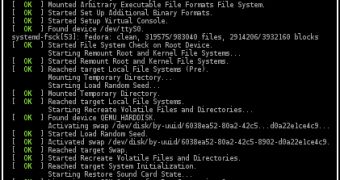systemd, a system and service manager for Linux, compatible with SysV and LSB init scripts that provides aggressive parallelization capabilities and uses socket and D-Bus activation for starting services, is now at version 196.
systemd 196 is mainly just a maintenance release, but it also comes with some new features that users might be interested in.
As stated in the previous version, systemd 196 will be implemented in Fedora 19, once it will properly get on the development track.
Highlights of systemd 196:
• udev now has support for loading additional device properties from an indexed database that is keyed by vendor/product IDs and similar device identifiers; • The Journal now has support for the "Message Catalog," an indexed database to link up additional information with journal entries; • The Python Journal bindings now has support for the standard Python logging framework; • The Journal API has received new functions for checking whether the underlying file system of a journal file is capable of properly reporting file change notifications; • It is now possible to set the "age" field for tmpfiles entries to 0, indicating that files matching this entry shall always be removed when the directories are cleaned up; • coredumpctl gained a new "gdb" verb which invokes gdb right-away on the selected coredump; • Support for "hybrid sleep" on kernels that support this has been implemented, in addition to "suspend" and "hibernate"; • systemd will now mount the EFI variables file system by default; • Socket units now gained support for configuration of the SMACK security label; • Support for various legacy and distro-specific concepts, such as insserv, early-boot SysV services, and so on, has been dropped; • For embedded systems it is now possible to build udev and systemd without blkid and/or kmod support.
A detailed changelog of the new release is available in the mailing list. Download systemd 196 right now from Softpedia.

 14 DAY TRIAL //
14 DAY TRIAL //